Book contents
- Interpreting Duns Scotus
- Interpreting Duns Scotus
- Copyright page
- Contents
- Acknowledgments
- Notes on contributors
- Introduction
- Chapter 1 John Duns Scotus’s life in context
- Chapter 2 The modal framework of Duns Scotus’s argument for the existence of a first cause
- Chapter 3 Duns Scotus on essential order in De Primo Principio and elsewhere
- Chapter 4 Duns Scotus on how God causes the created will’s volitions
- Chapter 5 Duns Scotus on free will and human agency
- Chapter 6 Duns Scotus on the dignities of human nature
- Chapter 7 Duns Scotus on matter and form
- Chapter 8 Duns Scotus, intuitionism, and the third sense of ‘natural law’
- Chapter 9 The bounds of sense: adequacy and abstraction in the later works of Duns Scotus
- Chapter 10 Before univocity: Duns Scotus’s rejection of analogy
- Chapter 11 Analogy after Duns Scotus: the role of the analogia entis in the Scotist metaphysics at Barcelona, 1320–1330
- Bibliography
- Index
Chapter 9 - The bounds of sense: adequacy and abstraction in the later works of Duns Scotus
Published online by Cambridge University Press: 23 December 2021
- Interpreting Duns Scotus
- Interpreting Duns Scotus
- Copyright page
- Contents
- Acknowledgments
- Notes on contributors
- Introduction
- Chapter 1 John Duns Scotus’s life in context
- Chapter 2 The modal framework of Duns Scotus’s argument for the existence of a first cause
- Chapter 3 Duns Scotus on essential order in De Primo Principio and elsewhere
- Chapter 4 Duns Scotus on how God causes the created will’s volitions
- Chapter 5 Duns Scotus on free will and human agency
- Chapter 6 Duns Scotus on the dignities of human nature
- Chapter 7 Duns Scotus on matter and form
- Chapter 8 Duns Scotus, intuitionism, and the third sense of ‘natural law’
- Chapter 9 The bounds of sense: adequacy and abstraction in the later works of Duns Scotus
- Chapter 10 Before univocity: Duns Scotus’s rejection of analogy
- Chapter 11 Analogy after Duns Scotus: the role of the analogia entis in the Scotist metaphysics at Barcelona, 1320–1330
- Bibliography
- Index
Summary
This essay focuses on the notion of “object of the intellect.” It argues that the distinction between “natural object of inclination” (obiectum naturale inclinabile) and “natural reachable object” (obiectum naturale attingibile) is at the basis of a fundamental reorientation in the doctrine of the first adequate object of the intellect in Duns Scotus’s later works. In the absence of any direct intellectual intuition of the soul and its potencies in this life, natural reason has no epistemic access to the first adequate object of the intellect except by way of abstraction of the per se objects it attains effectively. This insight induces Duns Scotus to revise his criticism of the position that he ascribes to Aristotle and Thomas Aquinas, namely that the “quiddity of material things” is the first adequate object of the intellect. Although Duns Scotus claims consistently that this position cannot be maintained by a theologian, he comes to accept it in his later works as correctly expressing the philosopher’s view of the first adequate object of the intellect in this life.
Keywords
- Type
- Chapter
- Information
- Interpreting Duns ScotusCritical Essays, pp. 184 - 203Publisher: Cambridge University PressPrint publication year: 2022

